Alternatives to Police in Mental Health Response Fact Sheet
Across the US, when people are in a mental health crisis, police are usually the first ones called. Only a very small percentage of calls (4%) concerning mental health emergencies result in EMS responding without police* .
This is problematic because police are not trained to be social workers or crisis counselors, many of them do not want to engage with this population and an armed police officer responding to someone in crisis can be very triggering; escalating situations rapidly and far too often with deadly results. Police are trained to respond to all situations with force first; meaning their primary go-to is to force compliance. However someone in crisis may not have the awareness or ability to comply leading to unnecessary and disastrous consequences. Anywhere from 50-75% of people killed every year in this country have a mental illness.
Furthermore, there is a structural lack of access to mental health resources for communities of color, which is compounded by the trauma of violence against communities of color by police and further compounded by the much greater likelihood of a police officer to use deadly force on Black people, Indigenous people and people of color. Hence this issue is of critical importance when we seek justice for communities of color, for impoverished communities, and for people living with mental illness.
Functional alternatives
While this critical issue is in desperate need of addressing nationwide, there are several cities, communities and even whole countries where alternatives to police in mental health response are already functioning.
For example:
CAHOOTS (Crisis Assistance Helping Out On The Streets) is a mobile crisis intervention team integrated into the public safety system in Eugene and Springfield, Oregon.
Oakland Power Projects trains health professionals “to increase resistance to the every-day violence of policing, strengthen people’s skills to respond to community health needs in ways that minimize police contact, and ultimately decouple access to health care from policing.”
MH First is a recently started program in Sacramento, CA, with a hotline and a team of health professionals volunteering their time to respond to mental health related calls.
In the United Kingdom, mental health calls are largely handled by the National Health Service, not police.
Globally, Indigenous peoples have long used and still do use traditional forms of governance and interventions in place of police and prisons.
The Call to Action
As communities across the state - and the country - begin to redefine public safety from militarized police and prisons to ensuring communities have the things they need to thrive like housing, work opportunities, substance abuse prevention and treatment and compassionate mental health support - the time is now for us to invest in these efforts to ensure communities have what they need to launch and create alternative models, push for policy at the local and state levels and introduce healing justice into our work and our communities.
* Los Angeles County Emergency Medical Services Commission, Ad Hoc Committee on Prehospital Care of Mental Health and Substance Abuse Emergencies, Final Report (Sept. 2016) (EMS Report).
